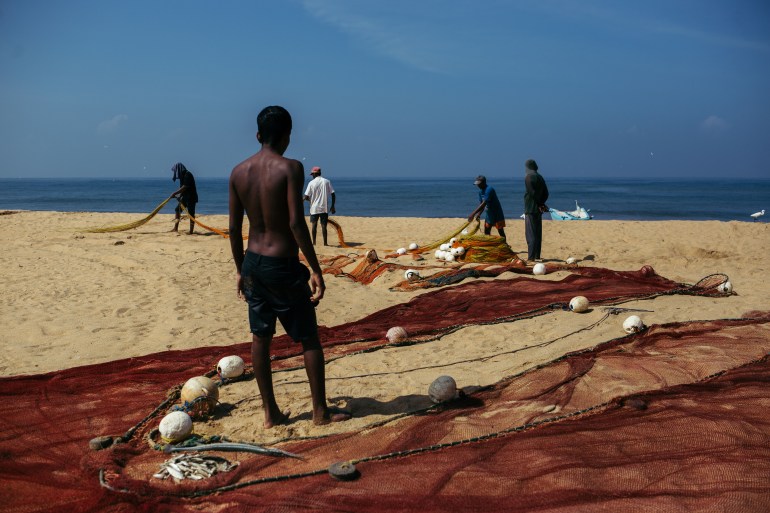Sri Lanka’s fishermen face double whammy of climate and economy | Business and Economy News
Babarandage don Sarath Appuham, a 59-year-old fisherman, has worked at Negombo Lagoon since he was a teenager. Palpable differences in tide patterns and fish catches from climate change have complicated his work.
“We used to always go at 9am, then 1pm. It’s no longer that predictable,” Sarath told Al Jazeera.
They have to gauge conditions day by day now, he said. Sometimes the waves are too rough to venture out on.
Along Sri Lanka’s 1,700km (1,056 miles) of coasts and lagoons, artisanal fishermen cast and gather their nets several times a day. Nearly half of the country’s animal protein intake comes from fish, close to three times the global average.
The exact style of net employed and method of fishing varies village by village, born from generations of experience. For instance, in the Kalpitiya peninsula in western Sri Lanka’s Puttalam district, beach seine fishers (who traditionally work in teams of 15-30 people, using a single net to surround a school of fish) employ very fine “bait” nets to catch smaller fish like anchovies and sardines. Larger meshed ones (seer and thara nets) cast further south are conducive for catching mackerel and tuna. An estimated thousand beach seines operate across the country.

But amid the familiarity of these enduring practices, new tensions and stresses are stirring as Sri Lanka continues to undergo the worst economic crisis in its history.
Sarath Appuham’s beach seine owner acquired a tractor a few years ago in an attempt to counter slumping labour issues and what seems to be fewer fish in the ocean. Although the winching allows Sarath and his colleagues to cast their nets up to four times a day, double what they could do when the work was fully manual, there is virtually no difference in total commercially viable fish caught at the end of the day.
Rocketing prices for pantry items such as beans and vegetable oil mean that his wife has cut back on her shopping for the family.

Pingback: https://stealthex.io
Pingback: 꽁머니 홍보
Pingback: https://vhnbio.com
Pingback: play go88
Pingback: Stripchat promo
Pingback: Diyala Info